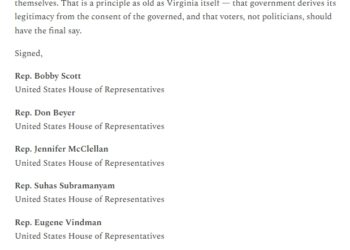( – promoted by lowkell)
On February 12, Virginia’s State Corporation Commission held a public hearing to decide whether to approve Dominion Virginia Power’s plan to buy 3 megawatts of solar power from Virginia residents and businesses to sell to the company’s voluntary Green Power Program. Sound like a good idea? It’s not.
Yes, Virginians want solar power. Investing in solar means stably priced electricity, cleaner air and lower greenhouse gas emissions. Solar power is now cost-effective in Virginia even in the absence of state incentives, thanks to federal tax credits and a steep decline in the price of solar panels. But a high upfront cost still limits who can afford to install it.
Utilities and the SCC have a role to play in bringing new solar power onto the grid. Dominion’s program to install 30 megawatts of solar on leased rooftops, which the SCC approved this fall, provides an example of how utilities can strengthen the grid, diversify their power sources, supply valuable peak-demand electricity, and contribute to their own learning curve on integrating renewable energy, all while meeting a portion of their customers’ demand for clean power.
The 3-megawatt program, on the other hand, gets nothing right. Under the program, customers who have solar panels would sell all their solar power to Dominion for 15 cents per kilowatt-hour (kWh), and buy regular fossil-fuel electricity (known as “brown power”) from Dominion at the normal retail rate of about 11 cents. Cost to Dominion: 4 cents/kWh.
Dominion would then resell the solar power to the participants in its Green Power Program, not for the 4 cents it costs the company, but for 11 cents. Dominion would keep 7 cents/kWh.
Dominion tells us that the 7 cents would go to its rate base, not its own bottom line. But it’s clear who loses. The do-gooders who pay extra on their utility bills for the Green Power Program would pay 11 cents for something Dominion bought for 4 cents. They are being played for chumps.
Last year the Green Power Program bought Virginia solar power directly for 4 cents/kWh through the purchase of renewable energy certificates. So why should the program pay 11 cents for something it can get for 4?
Since Dominion administers the program, it will be up to the SCC to prevent this misuse of its funds.
This is only part of the problem. The reason Dominion wants to shift the cost of the solar purchase onto the Green Power Program is its insistence that the value of solar energy isn’t the retail rate of electricity, but is the utility’s “avoided cost”-roughly, the price at which it can buy brown power on the wholesale market, which is around 4 cents/kWh.
Of course, if the current wholesale price were the only thing that mattered, you’d have to question why Dominion ever builds its own electric generation, including its new coal-fired plant that delivers power at 9.3 cents/kWh.
The SCC allows Dominion to build its own generation in Virginia for a host of other reasons, all of which apply equally to Virginia solar. Rooftop solar also provides significant additional benefits to the utility and the electric grid that utility-supplied brown power does not. A number of recent studies have quantified these benefits to prove that net-metered solar (where customers sell solar power to the grid at the retail rate) lowers costs for everyone.
Yet Dominion wants to shift costs onto a voluntary program, while keeping the benefits. This is bad for the Green Power Program, and it sets a terrible precedent for valuing solar that could retard its growth in Virginia. And that would be bad for all of us.
Note to readers: the Richmond Times-Dispatch declined to publish this piece last month unless Dominion gave them a response to be published at the same time. Dominion apparently did not do so, thus the piece was never published in print.

![[UPDATED with Official Announcement] Audio: VA Del. Dan Helmer Says He’s Running for Congress in the Newly Drawn VA07, Has “the endorsement of 40 [House of Delegates] colleagues”](https://bluevirginia.us/wp-content/uploads/2026/02/helmermontage.jpg)
















